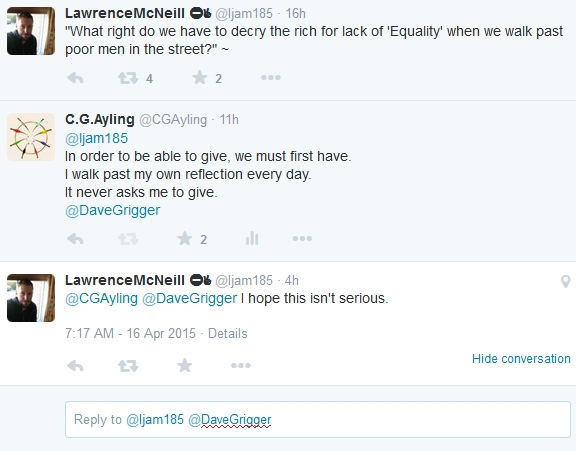If you’ve read anything on my blog, you already know how much words mean to me. If you’ve read nothing here yet, then believe me when I say they mean a great deal.
Why do words matter so much?
Because words have become the principle means of communication between humans. If we can’t communicate effectively then society is literally doomed. Words and their clear, unambiguous understanding are crucial to our very existence. Words are simply that important, yet we abuse and mistreat them. We choose to constantly dumb down language. We teach down to the lowest common denominator instead teaching up to the highest.
Yes, I am well aware words are not the only means of human communication. Indeed of the many ways we talk, I believe words are one of the most flawed methods we’ve developed to let others know what we really feel.
Non-verbal cues hold far greater truth than words ever can, and we don’t need to even speak the same dialect to interpret them! Non-verbal cues are universally, intuitively understood, need not be taught, and even the youngest understand them. Pitch and tone tell enormous truths that even dogs comprehend. Facial expressions hold universal meaning, not only across language barriers, but across continents, across millions of years of separated development, and even across species. Yes, primates and monkeys share the same fundamental facial expressions as we humans!
Perhaps, if we simply took time to stop talking, we could learn to understand?
However there is a very real problem with non-verbal communication. And it is this problem that makes the articulate use of words so crucial to all modern cultures.
What is the problem with non-verbal communication?
We no longer live in a face-to-face world.
We now communicate with people over vast distances. This communication is always via words. However, even when we speak to each other one-on-one via a telephone, poor quality sound distorts intonation and strips vast quantities of truth from our voices.
Video chatting is quite probably worse. It shows an out of sync series of pictures of the person viewing the images. We can’t see the vital details that tell the real truths. Why? Because those details are too small and happen too quickly to be conveyed in any real time video stream. In a video chat, a crinkle in the corner of the eye doesn’t reveal the lie. If it is noticed at all it confuses more than it clarifies by being out of sync with the audio stream. Mere hundredths of a second difference between speech and facial expression is enough to confound our ability to discern emotions and truths.
This means the only things left to ensure understanding between people, are words.
So when we find words being deliberately used to distort the truth, we should be offended. So-called Political Correctness is a prime example of truth distortion causing ripples throughout our cultures. Political Correctness attempts to prevent us from speaking the truth, for fear we might offend. Anything that prevents the dissemination of truth, whether by deliberately distorting the truth, or by actively suppressing the utterance of truth in clear unambiguous language should be deemed offensive.
In my opinion the two worst culprits of word abuse are religious dogma and political correctness. They are rampant, they are everywhere, and all of humanity is their victim.
And so, finally, to the prompt for this post… The devil dwells in the details, and over the years I’ve learnt I am troubled by eyes which discern the devil.
A few weeks ago we went to Kroger to buy a leg of lamb, which my talented and gracious wife would be cooking as part of a traditional Easter repast. We favor New Zealand Lamb, so I noticed the only available variety of lamb was from the USA. I also noticed the following wording, transcribed precisely as it appeared on the label:-
“BRN, RAISD, HARVSTD IN USA”
An immediate flush of irritation swept through me. The pursing of my lips and the narrowing of my eyes, two universal non-verbal cues of irritation, went unnoticed by my wife who was looking away. As I’ve alluded, non-verbal cues require complete and immediate attention to be understood.
Moving along… much as my wife and I did in the store.
Next purchase. Chicken thighs. A fairly cost effective source of protein, especially in comparison to the Lamb, which is extremely expensive. I notice not only the chicken’s price, but the following wording, again transcribed precisely as it appeared on the label:-
“Hatched, Raised and Harvested in USA”
By now my irritation has crept into my voice, which escapes in yet another non-verbal cue of irritation. Namely, a muffled snort. {Did I mention cross-species non-verbal cues? If I didn’t, be warned to get well away from a snorting Bull.} This time my wife notices, even though she is still looking away.
So what, precisely, is it that offended me in the labeling of those two products? The first label violates many conventions. It has striped most of the vowels, not bothered with capitalization, and rendered the statement virtually meaningless by doing so. Does “BRN” mean born, or barn? I’m reasonably confident “RAISD” means raised, but only reasonably. As for “HARVSTD”, well I am really hoping it doesn’t mean the lamb has been infected with a Harvard developed Sexually Transmitted Disease, which is what the acronym “STD” means back in Africa.
So, you may think it is the butchering of language in the first label that I find so offensive. You would be a little correct. However you’d also be a lot incorrect.
What truly offends me {I am being completely serious, I really am offended!} is the presumption that I, along with every other customer, is the uneducated idiot both labels imply.
Does The Kroger Corporation, in conjunction with its suppliers, think I am so stupid I actually believe Lamb and Chicken are the product of plants grown in a field? Lamb and Chicken are not harvested, they are slaughtered. A harvest correctly refers to a crop, it does not refer to living animals raised in order to be killed and eaten.
Kroger Corporation are not doing anyone any favors by facilitating the destruction of human language through politically correct twisting of the truth. Misleading people into thinking meat is grown on trees serves no one. Humanity is already so far removed from nature that billions of people will never have the opportunity to touch a Rhinoceros, or to witness the majesty of a Giraffe as it saunters by in its natural habitat. I am fortunate in having done both of these things, and a myriad more.
Sadly I doubt my children ever will.
We humans are way too far removed from nature. If Kroger Corporation and its suppliers want to avoid offending the sensibilities of their customers, there are better uses of language which are actually correct that they could employ. For example:-
“Product of the USA”
Please stop telling us meat is harvested when in actuality it is cut off the bones of creatures slain so we can eat them. Slaughter. Not a pretty enough word for you? And while you’re at it please stop using harvested as a correct description for catching fish. Yes I know some dictionaries specifically include fish as a product that can be harvested but as they say, the rot has to begin somewhere.
If businesses have something they’re hiding in their labeling, then I must ask why you feel the need to hide it. What other devilish details could Kroger be hiding in those mangled labels? A lot of things, but I’ll leave you to figure them out for yourself.
As I said, words are about communication. Unfortunately words are also frequently used to provide misinformation, which is something I also find offensive.
Perhaps you think this entire post is nothing more than a thinly veiled attempt to promote a vegetarian lifestyle?
It isn’t.
Though I would like to be vegetarian, the simple fact is that I cannot afford to be. And even if I could afford to pay for a healthy vegetarian diet for my family, I would not.
Why not?
Principally, because I do not impose my views on anything on anyone, not even my family {or perhaps especially not}. Regardless of how much I would like to become vegetarian myself, I will always leave that choice to each member of my family.
Secondarily, because I believe by nature and origin humans are opportunist eaters. This means I believe our bodies are not designed to eat only meat, or only vegetables. Thus when we impose such restrictions on ourselves by severely limiting our diet, we ultimately harm our bodies by depriving them of essential nutrients not available in one or the other variety of food. Humans are built to eat virtually everything, and therefore we should. In moderation, of course.
Bottom line? This post is really about precisely what it claims. It is about words that offend by being subtlety incorrect. Details matter. Words matter. Be detailed in your words.
{P.S. If you are one who notices how the tiniest of details are capable of changing the world, then Malmaxa might be worthy of your time.}





